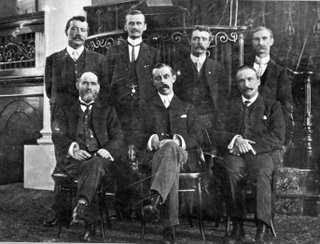 This posting looks at the way Boreham’s writing changed through his time at Hobart. As David Enticott addressed Boreham’s preaching and writing during the First World War, this article will not cover comprehensively this period.
This posting looks at the way Boreham’s writing changed through his time at Hobart. As David Enticott addressed Boreham’s preaching and writing during the First World War, this article will not cover comprehensively this period.The span of time within which Boreham wrote suggests significant changes in the society that he was addressing. He had left the northern hemisphere as a patriotic Englishman. The element of distance, his regular return visits and a diligent reading of English history developed his enchantment with the motherland. Many times Boreham reflected on the changes he had witnessed in his lifetime. In 1945, on the fiftieth anniversary of his ordination, he “indulged in a mental contrast” by saying, “Fifty years is not a huge slice of history, yet I remind myself today that, when I settled at Mosgiel, Queen Victoria was at the height of her tremendous popularity. Since then four kings have reigned over us. Three wars have been fought, each more terrible and more devastating than its predecessor”.[1] The changes that occurred across this wide time span raise questions as to whether Boreham stayed in touch with the times and to what extent his writings related to his readership over these years. While Boreham was keen to link people with the events and personalities that had dominated the broad sweep of history, in what way were his editorials addressing the important issues of his time?
Changing times
A survey by the author of the subjects that Boreham selected reveals some interesting changes of emphasis concerning his role in tackling the news items of his day and addressing the perennial concerns of every age. Following his initial stint in 1912 as a daily editor for the Mercury when his editorials were topical and related to the news, the first full year of Saturday articles in 1913 reveal his themes can be categorised in the following way:
THEMES IN THE EDITORIALS OF F W BOREHAM
THE MERCURY 1913
Unchanging values 16%
History/Biography 13%
Arts (literature, theatre, painting) 17%
Anniversaries (New year) 9%
Nature (seasons) 17%
Science & exploration 7%
Religion 1%
Sport 0%
Topical issues (current social concerns) 20%
The popularity of his preaching series (and subsequently the books of sermons) that commenced in 1911 and ran for 125 Sunday nights on Texts that made history was repeated in Armadale in the 1920s and led to an increase of editorials taking a historical or biographical theme. It is interesting to note that only thirteen percent (seven articles) of the editorials he wrote for the Mercury in 1913 had a reference to Tasmania or Australia; the rest had a distinctly British focus in the treatment of personalities and events. Boreham often referred to British newspapers and quoted from northern hemisphere journals such as the Edinburgh Review and Harper’s Magazine. While Boreham’s British bias could explain the paucity of Australian related editorials, he wrote in 1913, “We have overseas news but not much Australian news. Why? The bottom has fallen out of everything Australian”.[2]
Geoff Pound
Image: FWB and a group of six of his leaders. Elders? Deacons?
[1] Australian Christian World, 9 March 1945.
[2] Boreham, Mercury, 18 October 1913.